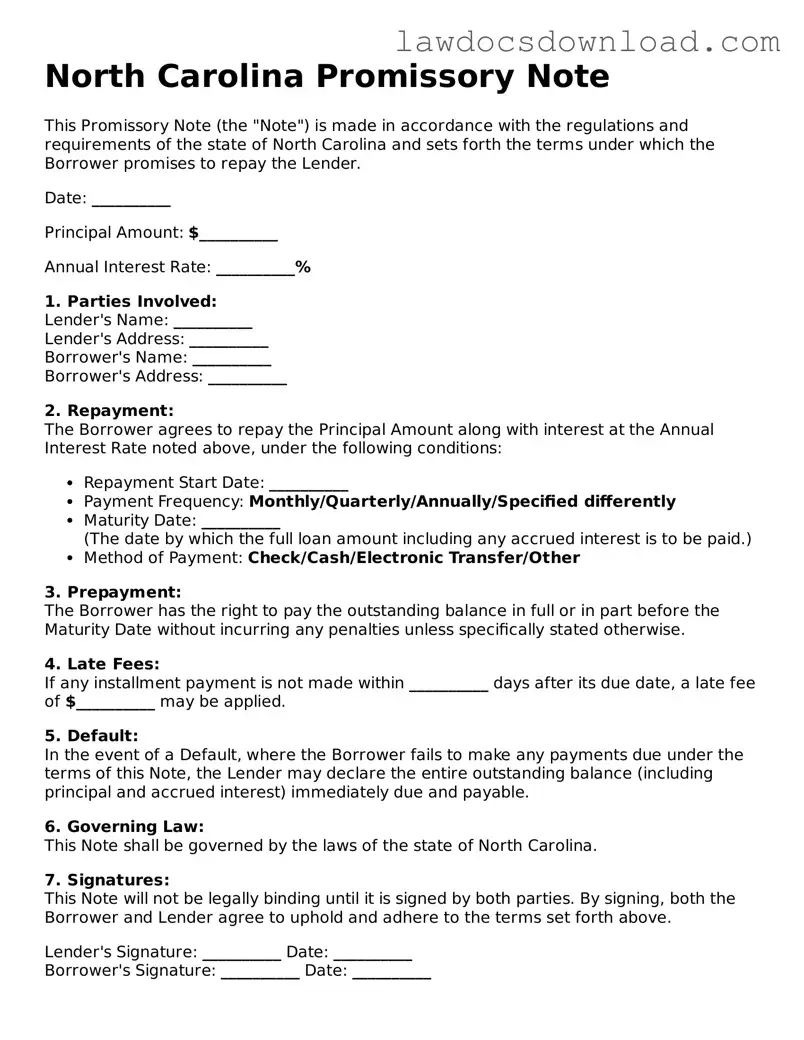A Mortgage Agreement is one document that shares similarities with the North Carolina Promissory Note form. Both documents are integral in the process of financing real estate purchases. While a promissory note serves as a borrower's promise to pay back a loan under agreed terms, the mortgage agreement secures the loan by using the property as collateral. This means that if the borrower fails to meet the terms of the note, the lender can enforce the mortgage agreement to reclaim the property.
The Loan Agreement is another document bearing resemblance to the North Carolina Promissory Note form. Both are legally binding contracts that detail the terms under which money has been lent and the obligations for repayment. However, a loan agreement typically provides more comprehensive details regarding the loan's conditions, including interest rates, repayment schedule, and consequences of default, making it broader in scope than a promissory note, which focuses more narrowly on the repayment promise.
The IOU (I Owe You) document also shares characteristics with the North Carolina Promissory Note. Both serve as acknowledgments of debt. However, the promissory note is more formal and includes specific repayment terms, such as payment amounts and due dates, making it more enforceable than an IOU, which is a more informal acknowledgment that a debt exists without detailing the repayment plan.
A Personal Guarantee is related to the Promissory Note form in that it involves a promise regarding payment. While a promissory note is a promise by a borrower to pay back a loan, a personal guarantee is a promise by a third party to repay the loan if the original borrower fails to do so. This provides an additional level of security to the lender that the loan will be repaid.
A Debt Settlement Agreement shares a purpose with the North Carolina Promissory Note in terms of addressing debts. It is typically used when a debtor is unable to pay back the original amount as agreed and the parties negotiate a lesser amount to be paid. While the promissory note outlines the terms of repayment from the beginning, a debt settlement agreement comes into play when those original terms cannot be met.
An Installment Agreement, much like the Promissory Note, outlines a repayment plan for a debt. This document is specifically tailored to situations where repayments are to be made in parts over time. Though both documents set forth a schedule for repayment, an installment agreement may be entered into after an initial promise to pay (like in a promissory note) cannot be adhered to as originally planned.
A Security Agreement has a connection to the Promissory Note form through its role in securing a loan. This document gives the lender a security interest in a specific asset or property of the borrower, serving as collateral for the loan. While the promissory note signifies the borrower’s intention to repay the loan, a security agreement provides the lender with a means to recover their funds if the borrower defaults.
The Credit Agreement shares its foundational concept with the Promissory Note: both involve the extension of credit from one party to another under defined conditions. Credit agreements, however, are often more complex and encompass not only the repayment plan but also the revolving nature of the credit, fees, covenants, and other detailed provisions not typically specified in a promissory note.
A Student Loan Agreement is particularly similar to a Promissory Note issued for educational purposes. It outlines the borrower’s commitment to repay borrowed funds used for education, including details on interest rates, deferment options, and repayment schedules. While both documents signify an agreement to repay a loan, student loan agreements often include specific provisions related to the educational nature of the loan, which are not found in general promissory notes.
Lastly, a Mortgage Note resembles the North Carolina Promissory Note form closely because it is a specific type of promissory note used in real estate transactions. It not only evidences the borrower’s promise to repay the loan but also includes details specific to mortgage loans, such as escrow arrangements for taxes and insurance. While all mortgage notes are promissory notes, not all promissory notes are mortgage notes, making their relationship particularly direct.

